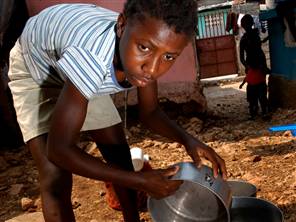 |
| Restavek |
| Want to send this page or a link to a friend? Click on mail at the top of this window. |
More Special Reports |
| Posted August 24, 2007 |
| Kids forced into domestic servitude in Haiti |
| 'Restavek' system thrives as impoverished families have little choice |
By Carmen Russell and Dane Liu |
Special to MSNBC.com |
PORT-AU-PRINCE, Haiti - Evans Antoine wakes at 7 a.m. and dusts himself off from his night on the floor. While other children in his middle-class neighborhood overlooking the Haitian capital head to school, the 15-year-old puts on toeless sneakers and gets to work washing dishes, scrubbing floors and running errands at the market. He also works in the yard and sometimes wields a scythe in the family's fields.
 |
| Restavek |
There is little reward for his toil, except for food and a roof over his head. And often, the quality of his work isn't good enough; his caretakers sometimes hit him with a switch or slap him on the back of the scalp. Once they tied his hands and put a bag over his head before beating him with a stick.
This has been his life for the past three years.
"They tell me that I'm useless," Antoine said, speaking softly at a meeting secretly arranged by a teacher who taught him briefly and who fears for his future. "They yell at me and tell me about all the things they do for me and how easy I have it." During the interview, Antoine never smiled. He also kept looking away while answering questions, clearly uncomfortable with the subject: his unforgiving life.
Antoine is a restavek, a Haitian term derived from the French for "stay with." But, he would rather be described by the more genial-sounding Creole phrase meaning "one who lives with people." He is among 300,000 children, 10 percent of Haitians under 18, who serve as domestics for other families, a tradition in Haiti dating back to the country's independence more than 200 years ago.
Haiti revolted against French colonial rule and became the first "black republic" in 1804. With newly emancipated slaves in power, it also became the first nation to outlaw slavery. Dependent on coffee and sugar, however, Haiti kept the plantation system after the revolution, requiring "mandatory labor" of many citizens. The masters were no longer white, but working conditions improved only marginally.
Children were particularly susceptible. The sons and daughters of slaves remained house servants following the revolution, indentured to newly rich army officers who took over the plantations.
| Key to the economy |
Today child workers remain an important part of Haiti's economy, a system that barely sustains a nation of 8.7 million that is wracked by poverty and lawlessness.
Haiti is the poorest country in the Western hemisphere. A little over half of primary school-age children are enrolled in school, according to UNICEF, and less than 2 percent finish secondary school.
Children become restaveks in a variety of ways. Some, like Antoine, are orphaned and taken in by family friends. Others are runaways pulled off the street. Most are given up by parents from depressed rural areas who can't afford to care for them and hope that another family will do better and send them to school.
 |
| Evans Antoine |
Antoine's case is an example of what so often goes wrong. His adoptive family promised to pay his tuition, but when it came time to do so, his adoptive father reacted harshly. "He said I was lying and he beat me," he said.
In fact, the majority of families are only slightly better off than restaveks' parents, despite living in the capital.
"It is not in Haitian culture to send children away," said Guerda Constante, a child-rights activist in the small coastal city of Jacmel. "Parents do this because they do not have the means to provide for their needs. It seems strange, but the parents are acting with love."
Promises by host families to feed, educate and take care of the children are just too alluring to poor parents, Constante said. In some cases, the new family meets those promises, but in most cases, she says, "the difference between the promise and reality is seen on the first day they arrive."
| Rural poverty |
It takes a bumpy four hours in a 4x4 to make the 60-mile trek from Port-au-Prince to the rural village of Fond des Blancs, where electricity and running water are scarce.
Over the treeless mountains to the south lies the Caribbean Sea. Single-room, thatched-roof huts dot the landscape, many housing families with 10 children or more.
Fond des Blancs has little communication with Port-au-Prince and the capital's political system has nearly no influence on the area. Lack of police has made it a favorite destination for Colombian planes to drop drugs for local Haitian runners to send onto the United States.
While some families farm or make charcoal, most have no regular means of support. In the most depressed areas, fortunate children are those that are fed once a day.
Children in places like these, activists say, are most at risk of winding up in the restavek system. A group of Fond des Blancs residents formed the Committee to Promote the Rights of Children of Fond des Blancs (COSEDERF) last year in an effort to keep children in the community.
The committee circulated a petition which asks Haitian leaders to "fulfill Haiti's obligations to provide free and compulsory education," believing fewer parents would send their children away if they had access to schooling.
"More than 50 percent of the children in Fond des Blancs don't have the chance to go to school," said Briel Leveille, a community leader and member of COSEDERF. "It is said that education is the foundation of development. It is through education that Haitians will one day come out of this misery."
| One U.S. community gets involved |
Hearing about the lack of education, one American school has become involved with the Haitian community.
At the Seth Boyden Elementary school in Maplewood, N.J., the PTA is trying to set up a sister-school relationship with those in Fond des Blancs. Students have been collecting school supplies and attended a Haitian Flag Day celebration.
U.S. school helps Haitian children use supplies brought by Tamara Thompson from New Jersey.
"I hope we can do a lot more than this," said Tamara Thompson, a former U.N. observer in Haiti who now resides in Maplewood and has a 9-year-old son who attends Seth Boyden. "Education is a key to ending the restavek system and it is their right."
For now, however, many parents in Fond des Blancs see the restavek system as the only hope for their children.
"I'm afraid to send them, but I really don't have any choice," said Rodette Clermanceau, a mother of 10 in Fond des Blancs. She is sending two of her children to Port-au-Prince to work for other families. Clermanceau has been raising her children alone since the father was sent to prison.
"If I had the financial means, I would not give them away," she said.
© 2007 MSNBC.com. Published Friday, August 24, 2007.
RELATED TEXT: Slavery in the family
| Wehaitians.com, the scholarly journal of democracy and human rights |
| More from wehaitians.com |